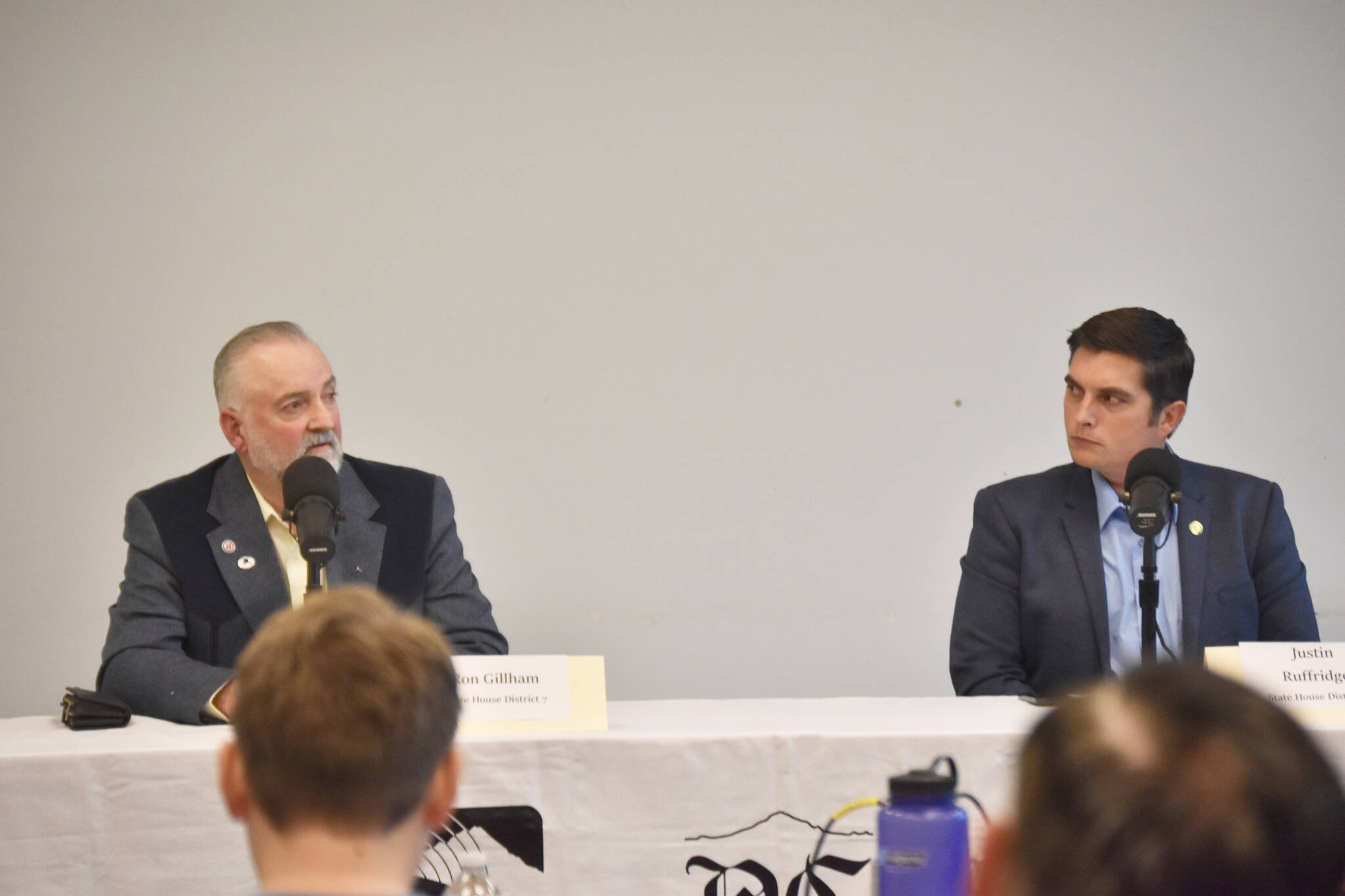Justin Ruffridge and Ron Gillham, the two candidates for the District 7 seat in the Alaska House of Representatives, met Monday to discuss education, energy and state finance during a candidate forum moderated by the Peninsula Clarion and KDLL 91.9 FM.
Incumbent Ruffridge, R-Soldotna, has served in the House since 2022, when he won election against Gillham, who served from 2020-2022.
Whoever is elected to the seat will serve a two-year term ending in January 2027.
Ruffridge introduced himself as a member of the Republican House majority and co-chair of the House Education Committee. He said he graduated from Wings Christian Academy, co-owns Soldotna Professional Pharmacy, and has been married for 20 years — father to two kids.
Gillham said he, too, is familiar with serving in the House, but said that he served in a minority. He said he’s lived on the peninsula for almost 40 years, raised his children here, and now works running heavy equipment on the North Slope.
Fiscal futures
Gillham said that state finance isn’t his top priority, if reelected — that he could surround himself with capable people to drive policy on budgeting. He said the state is spending too much on education, and that he wanted to see more money in people’s hands via the Alaska Permanent Fund dividend.
Ruffridge said he wanted to see the creation of a fiscal plan prioritized in the next legislative session. Specifically, he wants to see the dividend enshrined in the constitution, implement a spending cap and budget cuts, “particularly” government positions that have gone unfilled.
The state, Ruffridge said, also needs more revenue. Potential options include a sales tax, an income tax, or — “my personal favorite” — increased revenue from resource development. All those changes should be one bill, he said, rather than separate pieces.
Gillham said he agreed with the need for more revenue, but that he is “absolutely” against new taxes — though he later said he would support a 2% sales tax if it were packaged with the elimination of property taxes for people over 65 years of age.
Fishing for a solution
On fishing, Gillham said he wants to see a fishery enhancement bill passed that would create a fish-rearing program similar to a hatchery, but intended to “bring the fisheries back.”
Ruffridge said he wants to see opportunity for the east side setnet fishery, which has been restricted and shut down entirely in recent years. Those fishers, he said, are people who live in the community and should have access to the resource.
“They should be allowed to fish,” he said. “Particularly when we have record-setting sockeye runs. We are putting the onus of dwindling king salmon returns on, essentially, 200 small businesses in our community.”
Trawlers need to be scrutinized, too, Ruffridge said, citing a report by Nathaniel Herz’ Northern Journal that said two Kodiak trawlers caught 2,000 king salmon and triggered a closure of their pollock fishery.
Responding to a shortfall
Ruffridge said that, as a shortfall of natural gas looms, he’s already spent time working to identify and pursue solutions. He pointed to a bill signed last year increasing the amount of natural gas storage available on the peninsula as a short-term fix, but said that he wants to see a pipeline created from the North Slope to the Kenai Peninsula.
He acknowledged that, for some time, that has been “a pipe dream,” but said that the cost of building the pipeline would be better borne than the cost of important natural gas. Rising costs of energy are reflected each year on the state’s budget — Ruffridge said a pipeline could drive down those costs in the long run.
Gillham said that government regulation is the remaining obstacle to creating the pipeline. He said that if the government were “out of the way,” private industry would build it.
The two disagreed whether the government should have any role in funding the pipeline. Ruffridge suggested “incentive” from the state to a private partner to get the project moving. Gillham said the state shouldn’t play a role.
“I don’t believe it’s that hard of a project,” Gillham said. “I do not believe government should be footing the bill for it. It should all be private industry.
Spending for schools
Gillham said that he didn’t agree with increases to the amount of funding per student public schools receive.
“I don’t think we should be putting more money into a hole,” he said. “Until we get some accountability in our education system, I believe that any more money should be held back.”
Favored by Gillham is a system where money can “follow the child,” even if that means public funds being directed to a Christian or private school.
“Our constitution says that we are to maintain a school system — they don’t say how much we have to spend on it,” he said. “We need more charter schools, more private schools.”
Accountability, Ruffridge said, goes in two directions. He said that the repeated reliance on one-time funding for education from the state is not being spent where it needs to be because it’s not possible for schools to count on it. He said he supported the vetoed Senate Bill 140, which would have increased the base student allocation, especially where it would have brought homeschool families up to the same amount of funding as public school students.
Those students, he said, need just as much money and resources as “any other student.”
The full recording of the forum can be found on the “Peninsula Clarion” Facebook page. It can also be heard as “Kenai Conversation” on kdll.org or on podcast services.
This story was edited Thursday, Oct. 17, to correct a photo caption.
Reach reporter Jake Dye at jacob.dye@peninsulaclarion.com.

